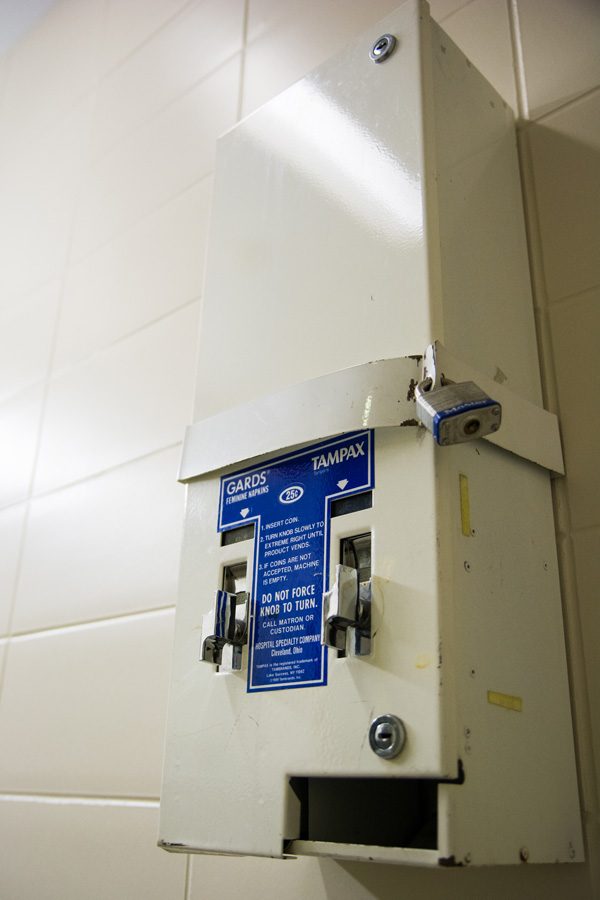Students start campaign for free menstrual products in campus bathrooms
Lauren Duquette/Daily Senior Staffer
University Library’s all-gender bathroom currently offers priced menstrual products. Various student groups are sponsoring a survey in an effort to make menstrual products available for free throughout campus.
September 28, 2016
Multiple student groups sponsored a survey Wednesday to receive student input on adding free menstrual products to all campus bathrooms before submitting a proposal to administrators.
Associated Student Government, College Feminists, Sexual Health and Assault Peer Educators and Rainbow Alliance are among the groups listed on the survey, which aims to “determine the optimal design of a program that would provide free menstrual products in all Northwestern bathrooms.”
Communication senior Amanda Odasz, the outreach chair for SHAPE, said information gathered from the survey will be used to draft the proposal.
ASG president Christina Cilento said she and executive vice president Macs Vinson, a McCormick senior, have already discussed the possibility of free menstrual products in bathrooms with an administrator who seemed willing to consider a pilot program after gauging campus need. The survey received more than 800 responses in eight hours, the SESP senior said.
SESP junior Sophia Etling, a member of Rainbow Alliance, said Cilento and Vinson may be able to present the proposal to administrators as soon as next week, and Etling said she hopes the products will be in bathrooms on campus before Spring Quarter.
SESP senior Sydney Selix, a member of College Feminists and the former president of SHAPE, said menstrual products are not a luxury.
“They’re a necessity for anyone who menstruates on this campus,” Selix said.
In early September, Brown University announced free menstrual products would be available in all nonresidential restrooms beginning fall semester. These efforts are representative of nationwide calls to remove the “tampon tax,” a code that classifies menstrual products as luxury items and taxes them as non-necessities, Etling said.
Still, students are pushing for more, Selix said.
“Students want something more long-term … and it’s something that the administration has the capacity to support both financially and ideologically,” Selix said.
Etling said the proposal will ask to make menstrual products available in men’s, women’s and all-gender bathrooms, as people who don’t identify as women may also have menstrual cycles.
Adding all restrooms to the initiative will bring more visibility to gender-nonconforming individuals, she said.
“This is finally something that’s going to get people thinking about how gender identity affects the way you use public spaces,” Etling said.
The student government at Brown decided students will distribute menstrual products throughout campus, but Etling said the products at NU should be distributed by a professional service, the same way toilet paper is.
“Menstrual products are a necessity in the same way toilet paper is a necessity,” Odasz said.
Brown spent $8,000 on its project, Etling said, but the proposal at NU will likely cost more due to delivery costs.
Students working on drafting the proposal are moving quickly to ensure the program goes into effect as soon as possible, Selix said.
Until the program is completed, free menstrual products can be found in restrooms at the Center for Awareness, Response and Education and at SHAPE’s weekly tabling events around campus or in Norris University Center.
Email: maxinewhitely2020@u.northwestern.edu
Twitter: @maxine_whitely
Correction: A previous version of this story misstated Sydney Selix’s year. Selix is a SESP senior. The Daily regrets the error.


